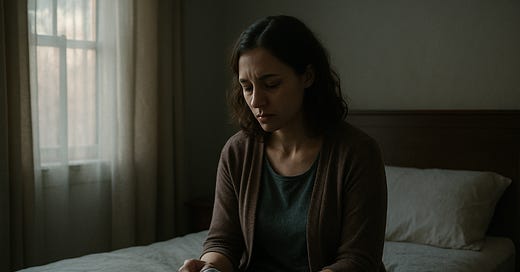It was almost immediately after my husband and I married that we began trying to conceive. We were both in our mid-30s, and even though I had just started my graduate program for clinical mental health counseling, I was terrified my window of fertility would shut. So, even though life was not at the ideal point for child rearing, we went forth anyway, hoping to expand our family soon.
Two and half years later, and we still did not have a baby. Not only had we not gotten pregnant, but my husband lost his job, and we had been scraping by for years while I went to school. Both of us experienced a decline in our mental health, and at one point I was wondering if I should stay in the marriage. This was early 2020, and as you know, we were about to enter a very unpredictable, scary time as a world.
After needless back and forth with insurance, several doctor appointments, and medical tests, we were finally getting closer to beginning fertility treatments. Our official diagnosis was infertility, male factor. I had hoped to start treatments that cycle but we could not yet because I had tested positive for a rare kidney disease during our genetic testing (this can be optional for couples, but due to our age, 36 at the time, it was required). My husband needed to test to determine if he was also positive before we moved forward because this kidney disease could be fatal. The doctors still wanted me to come in for blood work prior to my period starting, just in case.
That morning, a Friday, I went in for the blood work, not expecting anything out of the ordinary. When I came home, I started to have intense cramping, more painful than my usual period cramps. Then, when I used the bathroom, I noticed big clumps of clotty blood. This was abnormal. I actually felt so bad that I couldn’t go to my retail job that day, and I rarely called out from that job.
My husband and I had suspicions of what was happening, but there was no way to know for sure. Maybe it was just a more intense period. Maybe it was something else.
On Monday morning, I got a call from the fertility clinic. My HCG was positive. Not a high number, but also not 0. That was my confirmation. I had had a miscarriage. The fertility clinic asked me to come back for another blood draw, and this time it was a 0.
It seemed weird to say that I had had a miscarriage because I hadn’t realized it until after it happened and my regular period had taken over.
I told a few friends, some remarking that this was a good sign that my body could get pregnant. Not long after, a co-worker and I were running home from our shift at the retail store, and I randomly blurted out to him that I had had a miscarriage. He stopped, looked at me, and asked me if he could give me a hug. I took his hug, almost believing I didn’t deserve it. I couldn’t be sad about something that was never really mine, right?
According to the Mayo Clinic, 10-20 percent of known pregnancies end in miscarriage, with 80 percent of those happening in the first trimester. With the advancement of social media, more and more women are talking about their miscarriages but back in our mother’s fertility years, it was pain they often suffered in silence. Many still do to this day.
When we do think of miscarriage, it’s often ones that happen at 6-12 weeks. A pregnancy test has already shown a positive. Some friends and family may know. An entire life has been dreamt up so quickly and smoothly. Then, all of it ripped away in cold heartbreak that also brings immense physical pain, sometimes leading to medical intervention.
My miscarriage was nothing like that, and sometimes I don’t believe I’m allowed in the miscarriage club. However, like all things in the perinatal mental health world, everyone’s experiences are different and everyone’s experiences matter. There is no competition. It’s all sad.
No matter at what point it happens, a miscarriage is a loss. It’s grief. It’s pain. We are allowed to experience that loss, grief, and pain for what they are. We are allowed to sit in it and be sad for what could of been. We are allowed to honor what could have been. We are allowed to send what could have been love.
It’s been three years since my miscarriage, and I rarely think about it. In part, because I still don’t give myself permission to do so. Here, on this page, though, I do. I allow myself to see that experience and honor what was lost. I do so because I want to make room for others who felt something similar. I’m not alone, and neither are you.
You should totally check out … RESOLVE Fertility Support Groups. At the suggestion of a Facebook comment, I attended one of these groups while going through fertility treatments. I found the people in the group to be so loving but also courageous and undeterred at the loss and suffering they endured. They believed in their future babies so much that they continued through the darkest of days, which was incredibly inspiring and motivating for me. I highly recommend these support groups for anyone experiencing infertility.





Any miscarriage is allowed to be mourned! So the answer is yes, yes you are.